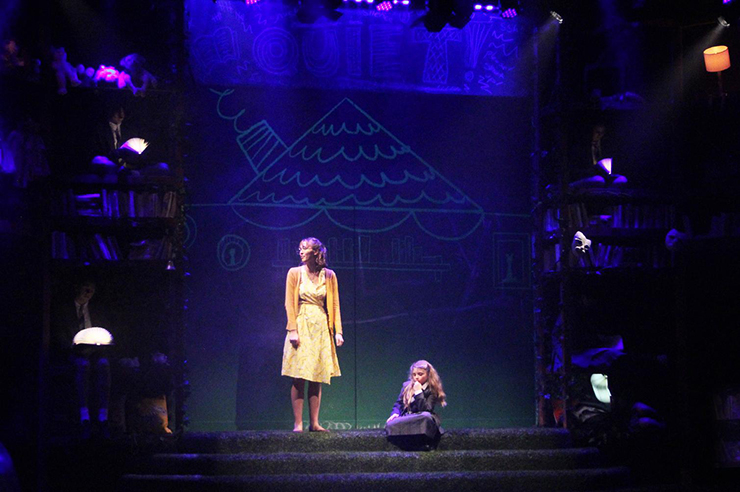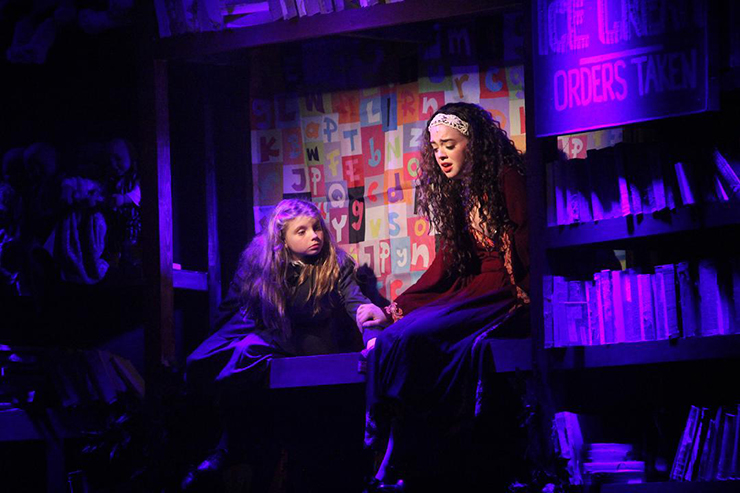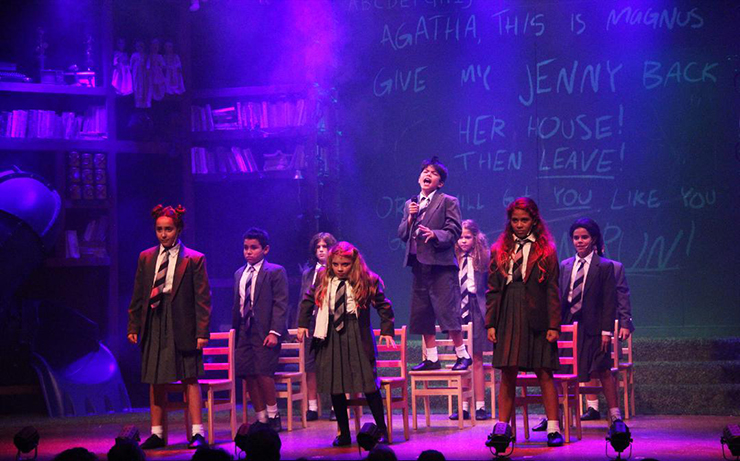The smell of rebellion from “revolting” children has rarely produced a sweeter scent.
The aroma emanates from the Riviera Theater in Coral Gables. That is where the resident Area Stage Company is mounting a mostly commendable production of "Matilda The Musical" through Sunday, Sept. 29.
Certainly, much of the credit for this production’s success goes to young visionary director Giancarlo Rodaz. Among other production values, he has helped instill inspiring spunk into the child actors who play the “Revolting Children” of "Matilda the Musical."

Miss Honey (Katie Duerr) and Matilda (Alejandra Bess) are deep in thought in Area Stage Company's production of Matilda The Musical.
Photo: John Rodaz.
Then again, “revolting,” as in disgusting, hardly seems an apt adjective for any good-natured, well-meaning youngsters.
Surely, this is true regardless of the time period. Yet, it seems particularly the case these days. Miss Trunchbull’s “Chokey" is an extremely narrow cage with sharp objects protruding from within. “The Trunchbull” locks her charges in these horrifying cages if she believes they have misbehaved. And, at least to her demented mind, which of them hasn’t at any given moment? To her, they’re all criminals, maggots and vile creatures.
With one of today's political hotbuttons, folks’ blood may boil even more today at the sight, sound and perhaps even stench of the Miss Trunchbulls of the world.
For all his twisted, exaggerated and dark humor, Dahl isn’t that far off base when we consider the world today. And under Rodaz’ deft direction, we never doubt which characters we should root for and those to detest.
Certainly, Corey Vega, in the traditionally cross-dressing role, is a frightening, androgynous Trunchbull.
In Vega’s hands, this headmistress’s anger and poison can simmer like a subtle, sneaky, slow-moving, slithering snake. During other scenes, Vega lends “The Trunchbull” a thundering, roof-raising menace that might make her charges shake. He speaks in either a quiet hiss or a sharp, penetrating voice and leans forward, like a lioness ready to pounce.
Come to think of it, one of the curiosities of Dahl’s novel is why this individual became a school headmistress in the first place. Does she enjoy tormenting children so much that she especially entered the field to do just that? Dahl never directly answers the question. Regardless, Vega’s performance, and this is testament to his strong portrayal, makes us wonder why even more.
Unquestionably, Miss Trunchbull stands for everything educators would rally against. For instance, she believes in “educating” through fear, intimidation and bullying. Obviously, the headmistress is a bully.
Matilda’s parents (a colorful, showy and silly Giorgio Volpe as Mr. Wormwood and an airheaded Amanda Acosta-Fernandez as Mrs. Wormwood) are more comic villains.
By contrast, Matilda’s teacher, Miss Honey, possesses traits befitting her name. She’s sweet without being overly sentimental and deeply cares about her pupils. Moreover, she believes the best way to educate children is through enthusiastically imparting knowledge and earnestly caring about them. But this teacher harbors another trait that the musical, even better than Dahl’s book, demonstrates. Specifically, that characteristic is her lack of self-esteem, at least in the beginning. As the story progresses, Miss Honey gains more pluck.
In the role, Katie Duerr early on conveys the teacher’s insecurities through insecure body language.
For instance, the performer uses this to great effect while singing “Pathetic,” her body obviously tense.
The character is trying to drum up courage to knock on Miss Trunchbull’s door to speak to the headmistress about Matilda. Through Duerr’s impressive rendition of the song, we keenly sense the teacher’s inner conflict as she berates herself for hesitating to knock on the door. Clearly, Miss Honey’s demeanor changes to more confident when she sings about “this little girl,” meaning Matilda.

Matilda (Alejandra Bess) comforts librarian Mrs. Phelps (Abigail Baldwin) after telling her part of a story.
Photo: John Rodaz.
Speaking of the title character, two youngsters alternate in the role. On opening night, eight-year-old Alejandra Bess (who alternates with West Rubin) played the precocious, prodigy-like mysterious little girl.
Kudos to Bess for imbuing Matilda with fierce determination and concentration. This is especially true during a later scene when Matilda is trying to put her magical powers to work. With her wide eyes and serious expression, Bess’ Matilda looks like an indomitable girl with, spirit, spunk, a strong will and bravery. It’s clear she’s not going to let her awkwardness or the fact that she’s “different” stop her from enjoying life. In short, she’s a strong female character who realizes that being small doesn’t mean you lack might.
Bess also demonstrates impressive versatility for a performer so young. In addition, she makes Matilda caring and sweet without acting too cute. Further, for a small girl, Bess has a clear, strong voice. This becomes clear through Matilda’s solos, “Naughty” and “Quiet.” The latter is a bit of tongue twister, like some other songs, yet Bess doesn’t stumble.
However, Bess needs to work on enunciating more and speaking more slowly. For instance, when Matilda relates a tale to the town librarian (an enthused Abigail Baldwin), we can barely understand the particulars. Of course, it is important that we understand the story about the acrobat and the escapologist. After all, this tale plays a major role in Matilda, as it demonstrates the girl’s almost unheard of abilities. To say much more would be to ruin the story for the few unfamiliar with Dahl’s tale.
Fortunately, the show retains Dahl’s dark, twisted humor while deepening the characterizations through song. And the lyrics by Tim Minchin are mostly clever, humorous and insightful. However, some are unnecessarily repetitive and pedestrian. Meanwhile, the music, also by Minchin, is often spirited, with hard-charging melodies mirroring the rebellious spirit of the children. At other times, the songs are softer and more contemplative, deftly fitting the mood of their respective scenes
Equally important, book writer Dennis Kelly has written a show that, like Dahl’s novel, will appeal to different ages. Certainly, children will find the pranks humorous. Also, younger audiences should be able to relate to the children, played here with energy and mettle. However, the child actors in this production sometimes are vocally difficult to understand during large, group numbers.
Overall, cast members possess expressive, clear and strong voices. A vibrant, live orchestra accompanies them without drowning them out.
One aspect of Matilda with which I’ve always had an issue is the placement of the song “When I Grow Up.” There is no transition into this song, during which the children sing about their hopes for the future. It comes suddenly and immediately after one of the children tells us about a prank she plans to play against Miss Trunchbull. To be sure, the song carries a sunny, upbeat and hopeful melody. In addition, the children sing this feel-good song brightly. But the show’s creators could have done a much better job in finding a transition into this song.
While children will find much to celebrate in Matilda, adults should appreciate themes such as standing up for what you believe is right and valuing others. In addition, the importance of reading is a major theme that always seems to retain its timeliness. After all, many youngsters seem constantly glued to their electronic devices. But if Matilda (the character) were living today, she’d be constantly reading – but hardly children’s books.
In a wise directorial choice, Rodaz keeps Matilda’s head buried in a book even before the show starts. One of the first things the audience sees as they enter the auditorium is the girl with her back to us, reading.

Bruce (Elijah Leano) gets his time in the limelight, surrounded by his classmates, at the end of the show.
Photo: John Rodaz.
The director, who is also the set designer, has constructed a world onstage that symbolically communicates the show’s themes and ideas. For instance, cases of books, block letters, dolls, stuffed animals and Matilda’s bed are built into the set. It also includes playground equipment such as slides. Through set construction, Rodaz seems to be saying that learning and playing are equally important – and that the two are not necessarily mutually exclusive.
From a staging standpoint, the director keeps the proceedings interesting by moving the actors around throughout the entire set, as well as offstage. Indeed, you never know from where an actor will enter or exit. While onstage, Rodaz keeps the actors close together, which can symbolize solidarity.
As though directing and set design were not enough, this versatile theater artist also designed the lighting. It provides focus and deepens mood through appropriate use of color. In addition, the lighting, while perhaps overdone a bit, produces some neat and seemingly real effects.
This young theater artist, known for his creative yet simple approaches to shows, mostly succeeds again with "Matilda." For instance, rather than creating multiple sets, he indicates on a projection screen places such as the Trunchbull’s office.
The production also includes some impressive magical effects.
Along with those “Revolting Children,” they help produce that sweet, irresistible scent emanating from the stage.
Area Stage’s production of Matilda runs through Sunday, Sept. 29 at the Riviera Theater, 1560 S. Dixie Highway in Coral Gables. Showtimes are 7:30 p.m. Fridays, 2 p.m. and 7:30 p.m. Saturdays as well as 5 p.m. Sundays. Tickets range from $15 to $45. For tickets, call (305) 666-2078 or visit www.areastagecompany.com.




